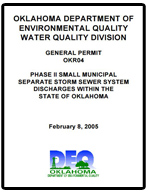
| Stormwater Permit Basics |
Background: In 1990, EPA adopted federal regulations requiring cities with more than 100,000 population, along with 11 categories of industrial activities, to obtain stormwater discharge permits. The purpose of these “Phase I” permits was to control pollutants in large urban areas that enter local waterways. One of the 11 industrial categories covered construction that disturbed five or more acres of land. |
 |
In Oklahoma, the two Phase I cities (Tulsa and Oklahoma City) both have individual permits, while all but one of the designated Phase II cities and counties have General Permits under the state’s Phase II General Permit for Small Municipal Separate Storm Sewer System Discharges (OKR04). The permitting authority in Oklahoma is the Oklahoma Department of Environmental Quality (DEQ).
Municipal permittees must develop strategies to identify and control pollutants from sources that are often difficult to manage, such as residential properties, vehicles and transportation corridors, and from illegal dumping of wastes directly into stormdrains and creeks. The stormwater program relies upon public education to encourage changes in behavior to reduce urban pollution from many urban sources.
The present EPA and DEQ rules require each Phase II permittee to address the following six categories of activities, called “Minimum Control Measures” (MCMs). This list may change with the renewal of OKR04 in 2020 or 2021.
1. Public Education and Outreach
2. Public Participation and Involvement
3. Illicit Discharge Detection and Elimination
4. Construction Site Runoff Control
5. Post-Construction Runoff Control
6. Pollution Prevention and Good Housekeeping
Regulations: The main body of federal regulations governing urban stormwater pollution are found in Title 40, Part 122 of the Code of Federal Regulations (40 CFR Part 122). Oklahoma Statutes have adopted the federal stormwater regulations by reference. The main body of state stormwater rules are found in Title 252, Chapter 606 of the Oklahoma Administrative Code (OAC 252:606).
Five-Year Stormwater Permit Cycles – Each of the 3 stormwater general permits in Oklahoma has a 5-year cycle. If a general permit expires before getting reauthorized, existing permittees continue to operate under the expired permit until the reauthorization process is completed. DEQ publishes copies of its stormwater general permits on their DEQ stormwater website. Assuming no delays in future reauthorizations, the approximate years of reauthorizations are:
• OKR04: 2015, 2020, 2025
• OKR05: 2017, 2022, 2027
• OKR10: 2017, 2022, 2027
